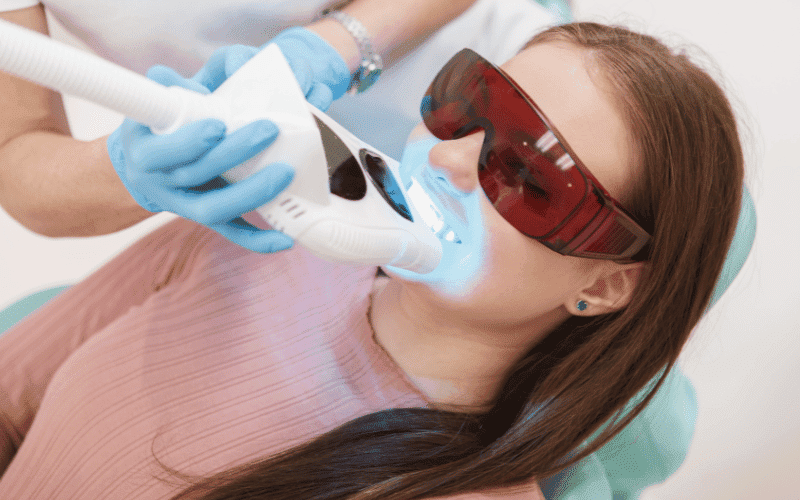Laser teeth whitening is a cosmetic dental procedure that uses a concentrated beam of light, typically a laser, to enhance the effects of a bleaching agent applied to the teeth. The process accelerates the whitening reaction, breaking down stains and discoloration on the tooth surface.
The treatment is quick—it can be done in a single session—and is well-known for producing notably whiter smiles. While results may vary, many individuals experience significant teeth whitening, making it a popular choice for those seeking a non-invasive and rapid solution to enhance the appearance of their teeth.
How Does Laser Teeth Whitening Work?
Laser teeth whitening, also known as laser bleaching, is a cosmetic dental procedure that enhances the effects of a teeth-whitening agent applied to the teeth.
1. Preparation: Before the procedure, a dentist will examine the teeth to ensure they are healthy and suitable for whitening. The dentist may also clean the teeth to remove any surface debris.
2. Application of Whitening Gel: A bleaching gel, usually hydrogen peroxide, is applied to the teeth. This gel is designed to break down stains and discoloration on the tooth surface.
3. Activation with Laser: A specialized laser, often a blue light or diode laser, is directed at the teeth coated with the whitening gel. The light energy activates the whitening agent, accelerating the chemical reaction that breaks down stains.
4. Intensification of Whitening: The laser’s energy enhances the penetration of the whitening gel into the tooth enamel, intensifying the whitening process. This results in a more rapid and efficient removal of stains compared to traditional teeth-whitening methods.
5. Multiple Sessions (Optional): Multiple sessions may be recommended depending on the desired level of whitening and the severity of stains. The duration of each session is around 15-30 minutes.
6. Post-Treatment Care: After the procedure, the dentist may provide instructions on maintaining good oral hygiene and avoiding certain foods and beverages that could stain the teeth.
It’s important to note that while laser teeth whitening can yield significant results, individual outcomes may vary, and longevity depends on factors such as lifestyle and oral care practices.
Pros of Laser Teeth Whitening
1. Rapid Results: One of the primary advantages is its speed. The process often takes a single session, and patients can witness noticeable improvements in tooth color within that short timeframe, making it an ideal option for those seeking quick results.
2. Enhanced Whitening: Using a laser during the procedure intensifies the whitening agent’s effects, leading to a more efficient breakdown of stains and discoloration. This often results in a brighter and whiter smile than traditional teeth-whitening methods.
3. Minimized Sensitivity: Laser teeth whitening may be associated with less tooth sensitivity than other whitening techniques. The precision of the laser allows for targeted application and activation of the whitening gel, reducing the likelihood of sensitivity issues.
4. Professional Supervision: The procedure is typically performed by dental professionals, ensuring a higher level of safety and effectiveness. Dentists can customize the treatment based on individual needs, addressing specific concerns and ensuring optimal results while minimizing risks.
5. Convenience: Laser teeth whitening is a relatively convenient cosmetic procedure. Patients can often achieve significant whitening in a single visit, eliminating the need for extended treatment periods. This makes it suitable for individuals with busy schedules seeking an efficient and effective teeth-whitening solution.
Cons of Laser Teeth Whitening
1. Cost: Laser teeth whitening tends to be more expensive than over-the-counter or at-home whitening options. The professional supervision and specialized equipment contribute to the higher cost, making it less budget-friendly for some individuals.
2. Temporary Sensitivity: While laser whitening is often associated with less sensitivity than other methods, some individuals may still experience temporary tooth sensitivity or gum irritation after the procedure. This discomfort usually resolves within a few days.
3. Not Permanent: The results of laser teeth whitening are not permanent, and the longevity of the whitening effect depends on various factors, including lifestyle choices and oral hygiene practices. Periodic touch-ups are essential to maintain the desired level of whiteness.
4. Not Suitable for All Stains: Laser teeth whitening may be less effective in addressing specific types of stains, such as those caused by trauma or medications. In such cases, alternative cosmetic dental procedures may be more appropriate for achieving the desired results.
5. Pre-existing Dental Issues: Individuals with pre-existing dental issues, such as tooth decay, gum disease, or extensive dental work (like crowns or veneers), may not be suitable candidates for laser teeth whitening. Addressing any underlying dental issues before the whitening procedure is crucial to ensure optimal results and avoid complications.
Wrap Up!
Laser Teeth Whitening in Missouri City stands out as a swift and effective option in the quest for a radiant smile. At Missouri City Dentist – Excel Dental, experience the prowess of professional care, rapid results, and minimal sensitivity.
While the procedure may entail a higher cost, the benefits of enhanced whitening, convenience, and expert supervision make it a compelling choice. For a brighter, more confident smile, trust the precision of laser technology.
Schedule your appointment with Missouri City Dentist – Excel Dental today and illuminate your smile!


